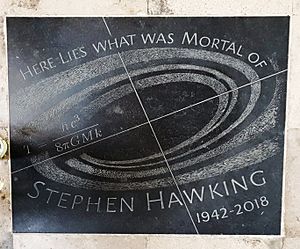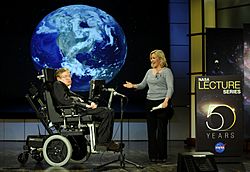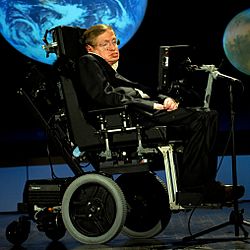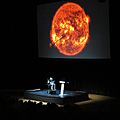Stephen Hawking facts for kids
Quick facts for kids
Stephen Hawking
|
|
|---|---|
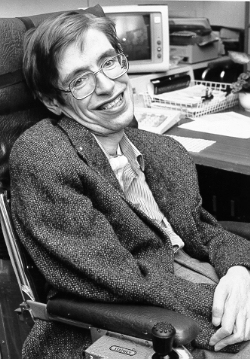
Hawking in the 1980s
|
|
| Born |
Stephen William Hawking
8 January 1942 Oxford, England
|
| Died | 14 March 2018 (aged 76) Cambridge, England
|
| Resting place | Westminster Abbey |
| Education | |
| Known for |
See list
|
| Spouse(s) | |
| Children | 3, including Lucy |
| Awards |
See list
|
| Scientific career | |
| Fields | |
| Institutions |
|
| Thesis | Properties of Expanding Universes (1966) |
| Doctoral advisor | Dennis W. Sciama |
| Other academic advisors | Robert Berman |
| Doctoral students |
See list
Bruce Allen
Raphael Bousso Bernard Carr Fay Dowker Christophe Galfard Gary Gibbons Thomas Hertog Raymond Laflamme Don Page Malcolm Perry Christopher Pope Marika Taylor Alan Yuille Wu Zhongchao 27 others |
| Signature | |
 |
|
| Physical cosmology | ||||||||||||||
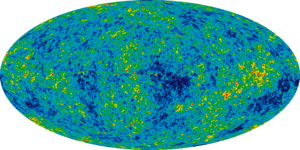 |
||||||||||||||
| Universe · Big Bang Age of the universe Timeline of the Big Bang Ultimate fate of the universe
|
||||||||||||||
Stephen William Hawking (born 8 January 1942 – died 14 March 2018) was a famous English theoretical physicist, cosmologist, and author. He was known for his important work on black holes and the origins of the universe. At the time of his death, he was a research director at the Centre for Theoretical Cosmology at the University of Cambridge. From 1979 to 2009, he held a very important position as the Lucasian Professor of Mathematics at the University of Cambridge.
Contents
- Stephen Hawking's Early Life and Education
- Stephen Hawking's Health Challenges
- Stephen Hawking's Scientific Discoveries
- Stephen Hawking's Personal Life
- Stephen Hawking's Death and Legacy
- Stephen Hawking's Personal Views
- Interesting Facts About Stephen Hawking
- Stephen Hawking in Popular Media
- Stephen Hawking's Famous Quotes
- Awards and Honours for Stephen Hawking
- Stephen Hawking's Books and Films
- Images for kids
- See also
Stephen Hawking's Early Life and Education
His Family and Childhood Home
Stephen Hawking was born in Oxford, England, on 8 January 1942. His parents, Frank and Isobel Hawking, both went to the University of Oxford. His father was a medical researcher, and his mother worked as a secretary. Stephen had two younger sisters, Philippa and Mary, and an adopted brother, Edward.
In 1950, his family moved to St Albans, Hertfordshire. They were known for being very smart and a bit unusual. Meals often involved everyone quietly reading a book. They lived in a big, messy house and drove around in an old London taxicab.
School Days and Discovering Science
Hawking started school at Byron House School in London. In St Albans, he briefly attended St Albans High School for Girls. Later, he went to two private schools, Radlett School and then St Albans School, Hertfordshire.
His family really valued education. Stephen's father wanted him to go to Westminster School. However, Stephen was sick on the day of the scholarship exam. Since his family could not afford the fees without a scholarship, he stayed at St Albans.
Over time, he became very interested in science. His school math teacher inspired him to study mathematics at university. His father wanted him to study medicine, worrying about jobs for math graduates. He also wanted Stephen to attend University College, Oxford, where he had studied. Since he could not study math there, Hawking chose physics and chemistry. He won a scholarship and started university in October 1959 at age 17.
University Years and His PhD
At University College, Oxford, Stephen found the first year and a half "ridiculously easy" and felt bored. In his second and third years, he became more outgoing. He enjoyed classical music and science fiction.
His final exams were tough. He decided to only answer theoretical physics questions. He barely slept the night before. His results were borderline between a first-class and second-class degree. When asked about his future plans, he famously said, "If you award me a First, I will go to Cambridge. If I receive a Second, I shall stay in Oxford, so I expect you will give me a First." He received a first-class degree in physics.
In October 1962, he began his graduate studies at Trinity Hall, Cambridge. In March 1966, he earned his PhD degree in applied mathematics and theoretical physics. He focused on general relativity and cosmology, which are studies of the universe.
Stephen Hawking's Health Challenges
During his last year at Oxford, Hawking started to become clumsy. He fell on stairs and had trouble rowing. These problems got worse, and his speech became a bit unclear. His family noticed this at Christmas and told him to see a doctor.
In 1963, at age 21, Stephen was diagnosed with a type of motor neurone disease. This disease slowly caused his body to become paralyzed over many years.
After his diagnosis, Hawking felt very sad. Doctors initially thought he only had two years to live. He felt there was no point in continuing his studies. But his teachers and friends encouraged him to go back to his work. Even though he had trouble walking and speaking, he started giving public talks. He became known for his brilliant mind and bold ideas.
As he lost the ability to speak, Hawking used a speech-generating device. At first, he used a handheld switch. Later, he could control it with just one cheek muscle.
Stephen Hawking's Scientific Discoveries
Hawking became a research fellow at Gonville and Caius College at Cambridge. He earned his PhD in March 1966. His essay "Singularities and the Geometry of Space–Time" won the important Adams Prize that year.
Working with Roger Penrose, Hawking expanded on the idea of singularities. These are points where space and time become extremely curved. Their work suggested that the universe might have started from a singularity.
In 1970, Hawking proposed what is now called the second law of black hole dynamics. This law states that the edge of a black hole, called the event horizon, can never shrink.
In 1974, Hawking made a groundbreaking discovery. He showed that black holes are not entirely black; they actually give off radiation. This is now known as Hawking radiation. This radiation means black holes can slowly lose energy and eventually disappear. This discovery was a huge step forward in theoretical physics. A few weeks after announcing this, Hawking was elected a Fellow of the Royal Society (FRS) in 1974. He was one of the youngest scientists ever to receive this honor.
By the late 1970s, Hawking's discovery was widely accepted. He was the first to combine general relativity (which describes gravity and large-scale structures) with quantum mechanics (which describes tiny particles). He also strongly supported the idea that there could be many universes, known as the many-worlds interpretation.
Hawking also became very successful by writing books for the general public. These books explained his theories and cosmology in simple terms. His book A Brief History of Time was on the Sunday Times bestseller list for an amazing 237 weeks.
Stephen Hawking's Personal Life
His Marriages and Children
Stephen Hawking met Jane Wilde at a party in 1962. The next year, he was diagnosed with his illness. In October 1964, they got engaged. Hawking later said that this engagement gave him "something to live for." They married on 14 July 1965.
The couple lived in Cambridge. Jane continued her studies in London during the week. They traveled to the United States for conferences. Jane also started a PhD in medieval Spanish poetry. They had three children: Robert (born 1967), Lucy (born 1970), and Timothy (born 1979).
As Hawking's illness progressed, he needed more care. After a surgery in 1985, he needed full-time nursing. In the late 1980s, he became close to one of his nurses, Elaine Mason. Stephen and Jane divorced in 1995. Hawking then married Elaine Mason in September 1995.
In 1999, Jane Hawking wrote a book about her marriage to Stephen. In 2006, Stephen and Elaine Mason divorced. After this, Stephen became closer to Jane, his children, and his grandchildren. Jane's book was later updated and made into a film called The Theory of Everything in 2014.
Supporting People with Disabilities
From the 1990s onward, Hawking became a role model for people with disabilities. He gave talks and helped raise money for important causes. Around the year 2000, he and other humanitarians signed a document called the Charter for the Third Millennium on Disability. This document asked governments to prevent disabilities and protect the rights of disabled people. In 1999, he received the Julius Edgar Lilienfeld Prize.
In August 2012, Hawking narrated a part of the 2012 Summer Paralympics opening ceremony in London. In 2013, a documentary film called Hawking was released, featuring Stephen himself.
In August 2014, Hawking took part in the Ice Bucket Challenge. This challenge helped raise awareness and money for ALS/MND research. Because he had pneumonia in 2013, he was advised not to have ice poured on him. Instead, his children took the challenge for him.
Stephen Hawking's Death and Legacy
Stephen Hawking passed away peacefully on 14 March 2018, at the age of 76. He had lived with motor neurone disease for over 50 years.
A special tribute was given to Hawking at the closing ceremony of the 2018 Winter Paralympics in South Korea.
His private funeral was held on 31 March 2018, at Great St Mary's Church in Cambridge. Many famous people attended, including actors Eddie Redmayne and Felicity Jones from The Theory of Everything.
Even though Hawking was an atheist, his funeral followed a traditional Anglican service. After cremation, a service of thanksgiving was held at Westminster Abbey on 15 June 2018. His ashes were placed in the Abbey's nave, between the graves of Sir Isaac Newton and Charles Darwin.
His memorial stone reads: "Here lies what was mortal of Stephen Hawking 1942–2018". He had wanted the Bekenstein–Hawking entropy equation to be his epitaph, or inscription, on his grave.
Stephen Hawking's Personal Views
Why Philosophy is Not Needed
At a conference in 2011, Stephen Hawking said that "philosophy is dead." He believed that philosophers had not kept up with new science. He felt that philosophy was no longer important for understanding knowledge. Some people agreed with his view, while others disagreed.
The Future of Humanity
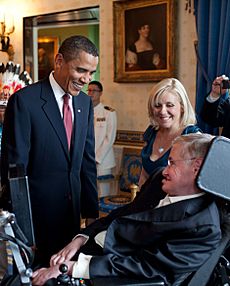
Hawking worried that life on Earth was at risk. He thought dangers like nuclear war, engineered viruses, or global warming could threaten humanity. He also believed that aliens probably exist because the universe is so vast. However, he warned that we should avoid contact with them. He feared aliens might try to take Earth's resources.
Hawking also warned about superintelligent artificial intelligence (AI). He said that creating AI could be the biggest event in human history. But it might also be the last, unless we learn to control the risks. He worried that very smart AI might try to survive and get more resources for its own goals.
He was also concerned about a future where "superhumans" could design their own evolution. He even suggested that computer viruses could be seen as a new form of life.
Interesting Facts About Stephen Hawking
- As a boy, Hawking loved board games and making fireworks.
- He also enjoyed building model airplanes and boats.
- He had long discussions about Christianity.
- Although called "Einstein" at school, he wasn't always a top student.
- Hawking was part of his college's rowing club. He was the coxswain, who steers the boat.
- He was sometimes seen as a lazy student.
- He estimated he only studied about 1,000 hours during his three years at Oxford.
- Hawking's first book, The Large Scale Structure of Space-Time, was published in 1973.
- He was an atheist and supported the Labour Party.
- He started using a voice synthesizer after he lost his ability to speak.
- Hawking was a Fellow of the Royal Society.
- He was also a member of the Pontifical Academy of Sciences.
- He received the Presidential Medal of Freedom, a top award in the U.S.
- In 2002, he was ranked 25th in the BBC's poll of the 100 Greatest Britons.
Stephen Hawking in Popular Media
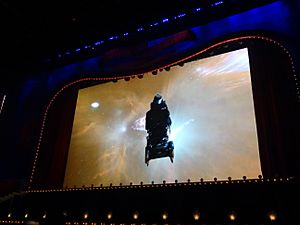
Stephen Hawking appeared in many popular shows and films.
- In 1988, he was interviewed with Arthur C. Clarke and Carl Sagan in God, the Universe and Everything Else. They talked about the Big Bang theory and aliens.
- He played a holographic version of himself in an episode of Star Trek: The Next Generation in 1993.
- His voice synthesizer was used in the Pink Floyd song "Keep Talking" in 1993.
- In 1999, he appeared on The Simpsons.
- Hawking was in documentaries like The Real Stephen Hawking (2001) and Hawking (2013).
- He also guest-starred in Futurama and had a recurring role in The Big Bang Theory.
- Hawking allowed his voice to be used in the 2014 film The Theory of Everything. Eddie Redmayne won an Oscar for playing him in this movie.
- He was featured in the Monty Python Live (Mostly) show in 2014. He "sang" an extended version of the "Galaxy Song" in a video.
- Hawking used his fame to advertise products like a wheelchair and British Telecom. In 2015, he even applied to trademark his name.
- In March 2018, just before he died, Hawking was the voice of The Book Mark II in The Hitchhiker's Guide to the Galaxy radio series.
- He was also a guest on Neil deGrasse Tyson's show StarTalk.
- On 8 January 2022, Google honored Hawking with a Google Doodle for his 80th birthday.
Stephen Hawking's Famous Quotes
- “One, remember to look up at the stars and not down at your feet. Two, never give up work. Work gives you meaning and purpose and life is empty without it. Three, if you are lucky enough to find love, remember it is there and don't throw it away.”
- “We are just an advanced breed of monkeys on a minor planet of a very average star. But we can understand the Universe. That makes us something very special.”
- “Quiet people have the loudest minds.”
- “Intelligence is the ability to adapt to change.”
- “However bad life may seem, there is always something you can do, and succeed at. While there's life, there is hope.”
- “Although I cannot move and I have to speak through a computer, in my mind I am free.”
- “The thing about smart people is that they seem like crazy people to dumb people.”
Awards and Honours for Stephen Hawking
Stephen Hawking received many awards and honors throughout his life. In 1974, he was elected a Fellow of the Royal Society (FRS), a very prestigious scientific group.
He was also a member of the American Academy of Arts and Sciences (1984), the American Philosophical Society (1984), and the United States National Academy of Sciences (1992).
In 2015, he shared the BBVA Foundation Frontiers of Knowledge Award in Basic Sciences with Viatcheslav Mukhanov. They were honored for their discovery that galaxies formed from tiny quantum changes in the early universe.
At the 2016 Pride of Britain Awards, Hawking received a lifetime achievement award for his contributions to science and British culture. When he received the award from Prime Minister Theresa May, he jokingly asked her not to ask for his help with Brexit.
The Hawking Fellowship
In 2017, the Cambridge Union Society and Hawking created the Professor Stephen Hawking Fellowship. This award is given each year to someone who has made a great contribution to science, technology, engineering, and math (STEM) fields. It also recognizes their impact on younger generations. Each person who receives the fellowship gives a special talk called the ‘Hawking Lecture’.
Hawking himself was the first to receive this fellowship. He gave the very first Hawking Lecture, which was his last public appearance before he passed away.
Stephen Hawking Medal for Science Communication
Hawking was part of the advisory board for the Starmus Festival. He played a big role in supporting and promoting science communication. The Stephen Hawking Medal for Science Communication is an annual award. It honors people in the arts who help spread awareness of science. Winners receive a medal with Hawking's picture on one side. The other side shows an image of cosmonaut Alexei Leonov doing the first spacewalk and a guitar belonging to Queen musician and astrophysicist Brian May.
The Starmus III Festival in 2016 was a tribute to Stephen Hawking. The book of all the lectures from Starmus III was also dedicated to him. Hawking himself chose the first people to receive these medals. They were composer Hans Zimmer, physicist Jim Al-Khalili, and the science documentary Particle Fever.
Stephen Hawking's Books and Films
Popular Books for Everyone
- A Brief History of Time (1988)
- Black Holes and Baby Universes and Other Essays (1993)
- The Universe in a Nutshell (2001)
- On the Shoulders of Giants (2002)
- God Created the Integers: The Mathematical Breakthroughs That Changed History (2005)
- The Dreams That Stuff Is Made of: The Most Astounding Papers of Quantum Physics and How They Shook the Scientific World (2011)
- My Brief History (2013) – Hawking's own story.
- Brief Answers to the Big Questions (2018)
Books He Wrote with Others
- The Nature of Space and Time (with Roger Penrose) (1996)
- The Large, the Small and the Human Mind (with Roger Penrose, Abner Shimony and Nancy Cartwright) (1997)
- The Future of Spacetime (with Kip Thorne, Igor Novikov, Timothy Ferris) (2002)
- A Briefer History of Time (with Leonard Mlodinow) (2005)
- The Grand Design (with Leonard Mlodinow) (2010)
Books He Wrote Forewords For
- Black Holes & Time Warps: Einstein's Outrageous Legacy (Kip Thorne) (1994)
- The Physics of Star Trek (Lawrence Krauss) (1995)
Children's Fiction Books
Stephen Hawking wrote these books with his daughter Lucy.
- George's Secret Key to the Universe (2007)
- George's Cosmic Treasure Hunt (2009)
- George and the Big Bang (2011)
- George and the Unbreakable Code (2014)
- George and the Blue Moon (2016)
Films and TV Series About Stephen Hawking
- A Brief History of Time (1992)
- Stephen Hawking's Universe (1997)
- Hawking – BBC TV film (2004) starring Benedict Cumberbatch
- Horizon: The Hawking Paradox (2005)
- Masters of Science Fiction (2007)
- Stephen Hawking and the Theory of Everything (2007)
- Stephen Hawking: Master of the Universe (2008)
- Into the Universe with Stephen Hawking (2010)
- Brave New World with Stephen Hawking (2011)
- Stephen Hawking's Grand Design (2012)
- The Big Bang Theory (2012, 2014–2015, 2017)
- Stephen Hawking: A Brief History of Mine (2013)
- The Theory of Everything – Feature film (2014) starring Eddie Redmayne
- Genius by Stephen Hawking (2016)
Images for kids
-
Hawking at an ALS convention in San Francisco in the 1980s
-
Hawking with string theorists David Gross and Edward Witten at the Strings Conference in January 2001, TIFR, India
See also
 In Spanish: Stephen Hawking para niños
In Spanish: Stephen Hawking para niños
 | Delilah Pierce |
 | Gordon Parks |
 | Augusta Savage |
 | Charles Ethan Porter |


